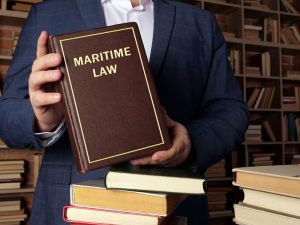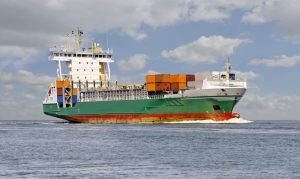Last Updated on February 20, 2025 by The Young Firm
Specific laws govern the rights of injured workers in maritime and offshore work.
These regulations, known as the Jones Act and Maritime Law, provide compensation and protection for injured persons on or near navigable waters.
Determining whether you have a Jones Act or maritime case is not always straightforward.
Certain factors must be considered to determine which laws apply to your case and how much compensation you can receive for economic and non-economic damages.
At Young Law, our Jones Act and Maritime Law attorneys empower all maritime workers with the knowledge to make informed decisions about their legal rights.
Why is There a Difference Between Maritime and Jones Act Cases?
When hurt on the job, injured victims can file for worker’s compensation to cover medical expenses and lost wages.
Unfortunately, current regulations often make employers immune to personal injury lawsuits when employees claim workers’ compensation for accident injuries.
Because the risk of injury and the severity of damages are much higher in offshore and maritime work, separate laws were enacted to provide additional protection for maritime workers.
The result is a unique and complicated set of dual existing laws that dictate who can and how much injured victims can recover.
Navigating the nuances requires the help of an experienced maritime law attorney who can help you understand your right to maximum compensation.
What Is The Jones Act?
History of the Jones Act
The Jones Act, or the Merchant Marine Act of 1920, covers many legal issues and requirements that all US ships must comply with to operate within US waters.
The act was initially created to promote American shipbuilding and protect the maritime industry from foreign competition.
However, one of the most significant provisions is the protection and compensation it provides for injured maritime workers classified as “seamen.”
Under the Jones Act, seamen are entitled to compensation for injuries caused by their employer’s negligence while working on a vessel.
Additionally, it allows them to file a personal injury lawsuit against their employer while collecting worker’s compensation.
Who Does the Jones Act Cover?
Eligibility requirements for Jones Act protection include:
- Workers must spend at least 30 percent of their time on a vessel in navigable waters.
- The vessel must be in navigation, meaning it is operational, afloat and capable of moving.
- The worker’s job duties contribute to the function or mission of the vessel.
Examples of eligible maritime workers under the Jones Act include:
- Captains, officers and crew members of commercial vessels
- Oil rig workers
- Ferry boat employees
- Tugboat workers
Sometimes, determining whether or not you qualify as a seaman under the Jones Act is challenging as multiple parties may fall into the category.
If you are unsure about your eligibility, consult an experienced maritime law attorney from The Young Firm.
What Damages Do Jones Act Cases Cover?
Should your case be eligible under the Jones Act’s maritime laws, you could receive compensation for:
- Medical expenses
- Lost wages and earning potential
- Pain and suffering
- Disability or disfigurement
The costs of these damages total millions of dollars over a lifetime. Waiting too long can cause you to miss out on crucial compensation that could significantly affect your recovery.
For this reason, it’s vital to seek legal advice as soon as possible after any injury occurs.
What Is Maritime Law?
A Brief History of Maritime Law
Maritime law, also known as admiralty law, originated in ancient civilizations. The Judiciary Act of 1789 created what we know as the modern day regulations and jurisdictions for Maritime Law in the USA.
Today, maritime law applies to all legal matters involving navigable waters – including shipping, fisheries, commerce and marine pollution.
Ultimately, it is a complex and ever-evolving area of law, with procedures and rules that differ from those in traditional land-based legal systems.
Who Is Covered Under Maritime Law?
Unlike the Jones Act, maritime law applies to all workers injured on or near navigable waters, regardless of their job duties.
This includes not only seamen but also:
- Longshoremen and harbor workers
- Oil platform workers
- Cruise ship employees
- Commercial fishermen
Coverage may also extend to temporary employees, seasonal workers, and those injured while boarding or disembarking a vessel.
What Damages Will Maritime Law Cases Cover?
Like Jones Act cases, maritime law allows injured victims to recover economic damages such as medical expenses and lost wages.
However, maritime law personal injury cases usually do not cover non-economic damages like pain and suffering.
Additionally, maritime law does not allow for personal injury lawsuits against employers when they can file a workers’ compensation claim.
Non-workers whose personal injury claim falls under maritime law may seek economic and non-economic damages through a maritime personal injury lawsuit.
Essential Questions to Understand Your Maritime Personal Injury Case
Did your offshore injury occur on navigable waters?
Navigable waters exist throughout the USA, with some of the most traveled, including the Mississippi River and the Gulf of Mexico near Louisiana.
Criteria that make waters considered navigable in the USA include:
- Whether the water is subject to the natural ebb and flow of the tide
- Whether it is used, was used, or could be suitable for highway commerce
- Whether it is considered navigable-in-fact
In the USA, navigable waters include open oceans, rivers, lakes, and canals. If your injury occurred and the factors above are present, you should be able to seek damages under the Jones Act.
However, Jones Act coverage may not be available if your injury occurred on a dock, pier, or rail system over water. Other laws, such as the Longshore and Harbor Workers’ Compensation Act, may apply.
You can schedule a free consultation with an experienced maritime law firm to discuss your case and determine how navigable waters affect it.
Are you a seaman?
Qualifying as a seaman under the Jones Act is essential for receiving compensation in many maritime personal injury cases.
In addition to time spent aboard requirements and the nature of work performed, a seaman must work for a single or fleet of vessels under one ownership.
If you are a freelancer, contractor, or independent operator working on a vessel, you may still be eligible for protection under Maritime Law. Consult with a maritime attorney to understand your specific case.
Were you on a vessel?
Generally, for anyone to be covered under the provisions of Maritime Law or the Jones Act, they must be working on a vessel.
If you were not, your personal injury claim may be subject to land-based workers’ compensation laws instead.
If your injury happened on a dock or pier, you may not be eligible for the special protections available under maritime law.
However, other legal avenues exist to seek compensation, and it’s important to speak with an experienced maritime lawyer to discuss your options.
Was the vessel owner negligent?
A critical tenant of General Maritime Law is that vessel owners must provide their employees with a safe and seaworthy vessel.
If you can prove negligence on the part of the vessel owner, such as failing to maintain equipment or provide necessary safety training properly, then you may be entitled to damages for your injuries through maritime law and/or the Jones Act.
Determining the seaworthiness of a vessel or equipment is a complex process. If you are unsure whether owner negligence led to your injury, it’s best to seek legal advice from a knowledgeable maritime attorney.
How Long Do I Have to File a Maritime or Jones Act Case?
The statute of limitations for filing a maritime personal injury case varies depending on the specific circumstances and jurisdiction.
In general, you must file claims under Maritime Law within three years of the accident.
While this may seem like a considerable time frame, think about the immediate and long-term burdens you’ll have to face before being physically, financially, and emotionally capable of filing a case:
- It can take time to fully understand the extent of your injuries and their long-term effects on your health and livelihood. Carefully reviewing your medical records over time may be necessary to build a solid case.
- Gathering evidence is especially tricky when seeking damages for an accident under maritime jurisdiction. It takes time to piece together details of the accident and great care to preserve evidence before it is lost.
- Dealing with insurance companies is time-consuming and overwhelming. They’ll likely do everything possible to minimize or deny your claim, making the process even more difficult.
- Recovering from physical injuries such as spinal cord or brain damage may take years, making it difficult for you to return to work and earn a living. This financial disruption has severe implications for your mental and emotional well-being.
- The emotional toll of a severe injury and the financial burden it brings makes starting the legal process a challenge. You may experience frustration, fear, anger, anxiety or depression as you try to navigate through the complexities of a maritime personal injury case.
Given these obstacles to filing deadlines, it’s easy to see how a statute of limitations could quickly pass by while you’re still trying to recover and get back on your feet.
Therefore, it’s essential to consult with a maritime attorney as soon as possible after an accident. This will ensure all necessary steps are taken to protect your rights and pursue the compensation you deserve.
How Much Is My Maritime or Jones Act Case Worth?
Even minor injuries can lead to substantial medical bills, and more serious injuries can require extensive medical treatment and long-term care.
For example, slip-and-fall accidents are the most common injuries in the maritime industry and can lead to spinal cord damage, traumatic brain injury, and broken bones.
Upfront costs for these injuries can range from $5,000 to over $400,000, often exceeding $1 million in lifetime costs.
Furthermore, both cases allow injured victims to recover lost income and earning capacity if their injuries are so severe they can no longer work.
Considering that the average salary for a seaman in Louisiana often exceeds $70,000, even a short time without work can significantly impact one’s income and overall financial stability.
If your case is pursuable under the Jones Act, its value may increase with added damages for pain and suffering. These damages may vary depending on the extent of your injuries but can significantly increase the overall value of your case.
For example, states like Louisiana, do not cap damages for pain and suffering unless a government entity owns the vessel. If so, the state caps non-economic damages at $500,000.
The unique factors determining the value of a maritime or Jones Act case make it difficult to provide an estimate without an injury lawyer examining all the details.
However, you may recover significant compensation for your injuries and losses, and seeking legal representation can help ensure you receive maximum compensation.
Do You Have a Jones Act or Maritime Case? Contact Young Law Firm for Comprehensive Legal Support
Understanding if you have a Jones Act or maritime case is overwhelming, especially when dealing with the physical, financial, and emotional toll of a serious injury.
That’s why it’s crucial to seek guidance from experienced maritime attorneys who can navigate the complexities of these laws and fight for your rights.
The Young Law firm has extensive experience handling maritime and Jones Act cases, and we are committed to providing comprehensive legal support for our clients.
Get your free consultation with a maritime law attorney and start your journey towards the full and fair compensation you deserve.





